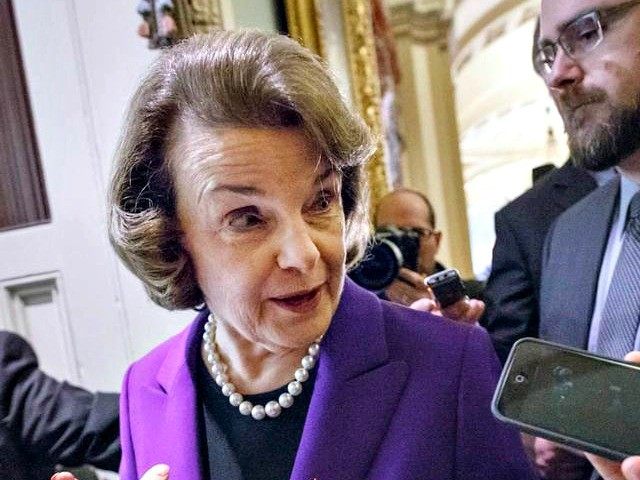When Breitbart News reported in ‘FAA Proposes Commercial Drone Licenses To Anyone Paying $200 Fee,’ we commented that, “By next Christmas, aerial drones will be all the rage.”
It seems that Christmas came early, because drone sales have already lifted off. Facing real life and death safety issue, Senator Dianne Feinstein wants to accelerate the FAA’s plan to police consumer drones that weigh less than 4.4 pounds.
Feinstein has been vowing since December to introduce legislation for the FAA to restrict the use of private drones. She called the current exemption for non-commercial of line-of-sight operation of drones a “loophole [that] must be closed.” Senator Dianne Feinstein (CA-D) on Thursday introduced the Consumer Drone Safety Act as an emergency effort to address numerous near misses that are plaguing airports and commercial passenger flights. The bill would direct the FAA set altitude restrictions on private drones, as well as limitations on flight areas.
Most officials thought that drones would generally be operated for commercial purposes. But the combination of: 1) The marriage of the drone with action camcorders; 2) The ability to control the aircraft with a smartphone; 3) Consumers’ penchant to chronicle and share everyday activities on social media; and 4) More robust wireless connections has caused an explosion in consumer interest.
According to recent FAA reporting, there have since been 190 documented “incidents” this year where personal consumer drones have crashed or narrowly missed manned aircraft and flown close to sensitive civil infrastructure, such as power plants.
The Federal Aviation Administration (FAA) unveiled its first proposed commercial drone use regulation for unmanned aerial vehicles under 55 pounds in February. By formally legitimizing commercial use, Breitbart News predicted the FAA had just launched a billion-dollar American-based commercial use industry.
About 95% of unmanned aerial vehicles in 2012, aka “drones”, were operated by the U.S. military, with a sprinkling from France, U.K., Germany, India, and Israel. But today, the tens of thousands of military drones are overwhelmed by several million commercial and personal drones operating for fun and profit around the world.
The new FAA interim commercial regulations are supposed to be issued by Christmas will not require operators to obtain a regular FAA pilot’s license or demonstrate their flying skills. They will simply need to pass a written “proficiency test,” register the drone with the FAA, and pay about $200 in fees.
The FAA’s rules will restrict the commercial use of unmanned aerial vehicles initially to daylight hours and require drones to remain within eyesight of the operator or observers posted on the ground. The maximum speed would be limited to 100 miles per hour and a maximum altitude of 500 feet.
Full approval is not expected until at least until early 2017, but the FAA estimates that more than 7,000 business permits will be issued in the next 3 years.
But the L.A. Drone Expo held at the Los Angeles Memorial Sports Arena in late December demonstrated that thousands of drone enthusiasts are already flying drones for fun and profit, despite still being illegal.
Even more problematic than professional operators, U.S. sales to individual operators have been increasing like wildfire as drones are drones have become cheaper, more powerful, and easier to fly. Amazon offers dozens of brands, starting at $50. DroneFly, in its second year of operations is advertising that they sold over $27 million in drones in 2014 and expect to triple sales this year.
There have been serious close calls between drones and passenger jets crossing paths, such as the YouTube videos that show “flyaway” when drones lose Wi-Fi connections or suffer from faulty programming and crash.
FAA officials told Senator Dianne Feinstein they already are considering a separate set of rules for consumer “micro-drones” that weigh less than 4.4 pounds. But Senator Feinstein is still upset that under those rules, operators would not have to pass any kind of test; they would only have to submit a written statement to the FAA promising that they were familiar with basic aviation safety measures.

COMMENTS
Please let us know if you're having issues with commenting.